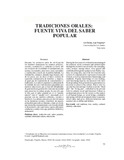| dc.rights.license | http://creativecommons.org/licenses/by-nc-sa/3.0/ve/ | |
| dc.contributor.author | Gil Terán, Ana Virginia | |
| dc.date.accessioned | 2012-04-16T15:43:14Z | |
| dc.date.available | 2012-04-16T15:43:14Z | |
| dc.date.issued | 2012-04-16T15:43:14Z | |
| dc.identifier.issn | 0798-1570 | |
| dc.identifier.uri | http://www.saber.ula.ve/handle/123456789/34843 | |
| dc.description.abstract | Durante los primeros años de civilización
los hombres manejaron los asuntos políticos,
sociales, económicos y culturales a través del
uso exclusivo de la oralidad: el razonamiento, las
normas, los tratados, entre otros; eran convenidos
y establecidos a través de la palabra hablada. La
oralidad fue, entonces, durante largo tiempo, uno
de los pocos, por no decir el único sistema de
expresión comunicativa de hombres y mujeres,
al igual que de transmisión de conocimientos y
tradiciones. Los saberes populares se alimentan de
la oralidad, de esos conocimientos guardados por
nuestros antecesores que se han ido difundiendo
de generación en generación como una necesidad
para preservar la cultura propia. Es por ello que
se dice que el saber popular no es el “pasado
muerto” sino el “pasado vivo”, encarnado en el
presente con sus cambios culturales, sociales e
históricos. La cultura como proceso de relevancia
en las instancias sociales, constituye un aspecto
primordial para todo ser humano, como ser social,
que interactúa constantemente con el medio donde
se desenvuelve, del cual toma y aporta diferentes
conductas y asume roles que permiten defi nirlo y
delimitarlo. | es_VE |
| dc.language.iso | es | es_VE |
| dc.rights | info:eu-repo/semantics/openAccess | |
| dc.subject | Tradición oral | es_VE |
| dc.subject | Saber popular | es_VE |
| dc.subject | Oralidad | es_VE |
| dc.subject | Identidad cultura | es_VE |
| dc.subject | Educación | es_VE |
| dc.title | Tradiciones orales: fuente viva del saber popular | es_VE |
| dc.type | info:eu-repo/semantics/article | |
| dc.description.abstract1 | During the fi rst years of civilization men managed
the political, social, economic and cultural rights
through the exclusive use of orality: the reasoning,
rules, treaties, among others, were agreed and
established through the spoken word. Orality was,
then, for a long time, one of the few if not the only
system of communicative expression of men and
women, as well as transmission of knowledge and
traditions. Popular knowledge of oral feeding,
such knowledge kept by our ancestors who have
been spreading from generation to generation as a
necessity to preserve the culture. That is why we
say that the conventional wisdom is not the “dead
past” but “living past”, embodied in the present
with its cultural, social and historical. Culture as
an important process in the social, is a key aspect
to all human beings, as social beings, constantly
interacting with the environment where it operates,
which takes and gives different behaviors and
assume roles to defi ne and delimit. | es_VE |
| dc.description.colacion | 75-84 | es_VE |
| dc.description.email | virgilt@hotmail.com | es_VE |
| dc.identifier.depositolegal | PP92-0047 | |
| dc.subject.centroinvestigacion | Centro de Investigaciones Literarias y Lingüísticas Mario Briceño Iragorry | |
| dc.subject.facultad | Núcleo Rafael Rangel (NURR) | es_VE |
| dc.subject.keywords | Oral tradition | es_VE |
| dc.subject.keywords | Orality | es_VE |
| dc.subject.keywords | Cultural identity | es_VE |
| dc.subject.keywords | Education | es_VE |
| dc.subject.publicacionelectronica | Revista Cifra Nueva | |
| dc.subject.seccion | Revista Cifra Nueva: Artículos | es_VE |
| dc.subject.thematiccategory | Artes y Humanidades | es_VE |
| dc.subject.tipo | Revistas | es_VE |
| dc.type.media | Texto | es_VE |


